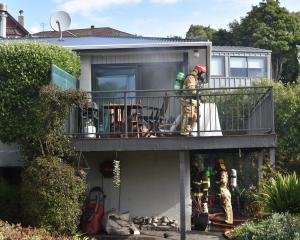The Government has ordered additional reports into loading standards for balconies after collapse of a balcony on Castle St which injured 18 people.
A government report released today said overloading was the "principal'' cause of the March 4 collapse during a Six60 concert.
Loading standards of residential balconies with a risk of overloading and a practice called "notching'', which shortens joists but still complies with building standards, would be investigated further.
Ministry of Business, Innovation and Employment Minister Dr Nick Smith delivered the report to a handful of media in Castle St this afternoon.
"The fundamental reason ... the balcony collapsed was because it was overloaded,'' Dr Smith said.
"The most important thing is for people to be aware that the building code in residential areas provide for two people per square metre.
"Nearly twice the number of people it was designed to support were on the balcony and many of those people were grouped at one end of it.''.
The investigation found the balcony was built to standard for that time and had a code of compliance certificate.
Dr Smith said "notching'' meant joists holding up the balcony were reduced in size from 200mm by 50mm to 150mm by 50mm on construction.
"There are some engineers that have a view that it causes stress fractures ... that can make that building more vulnerable.
"This was quite within the code but is a building technique some timber engineers are concerned may create stress weakness,'' Dr Smith said.
The University of Auckland had been commissioned to analyse that, he said.
Asked about other balconies around New Zealand with a risk of overloading, Dr Smith said there may be changes to standards.
"We might want to put into the building code provisions for a higher level of loading.
"That's something I'm simply asking officials to have a look at.
"There are tens of thousands of balconies around New Zealand ... [and] I would not want to create the expectation that that removes that underlying responsibility for all of us,'' he said.
There were lessons to be learned from the collapse, Dr Smith said.
"The most valuable lesson for this accident is for people not to use residential balconies as grandstands.
"[They] should be used for the purpose for which they are intended.''
Richard McKnight, a 50% shareholder in company Ogato Investments Ltd which owns flats in the block at 598 Castle St, said all of the remaining balconies would be reduced in size so fewer people could be on them at once.
An engineer was sent the designs on Tuesday and in the mean time students had been asked to stay off the remaining balconies, he said.
Dunedin Mayor Dave Cull welcomed the report and the opportunity to work with the University of Otago on developing guidelines around running events not organised by the university.
University of Otago vice-chancellor Prof Harlene Hayne said they were already liaising with the Otago University Students' Association and the Dunedin City Council.
"[We're] developing some systems that will allow our students in their private capacity to organise fun and safe events that have the same level of care that is provided by events that are already organised by OUSA,'' Prof Hayne said.
The university had had no contact from Six60 band members but was looking to have contact between students involved and the band so each could "give their side of the story'', she said.
"Our Hearts still go out to the victims of the balcony collapse, their families and obviously the wider student community who was very heavily effected by the event.''
OUSA president Laura Harris said health and safety was its primary focus at events.
"I think it's important to acknowledge this event wasn't one run by the students and therefore we do heavily encourage all of the external promoters that do come to Dunedin make health and safety a priority when running events in our student residential areas,'' she said.
An independent report commissioned by the DCC and released earlier this month found the balcony was "critically overloaded''.
Among the 18 people injured was University of Otago student Bailley Unahi (19) who sustained serious spinal injuries.
Miss Unahi has started rehabilitation at Burwood Hospital in Christchurch where she has been since the incident.












